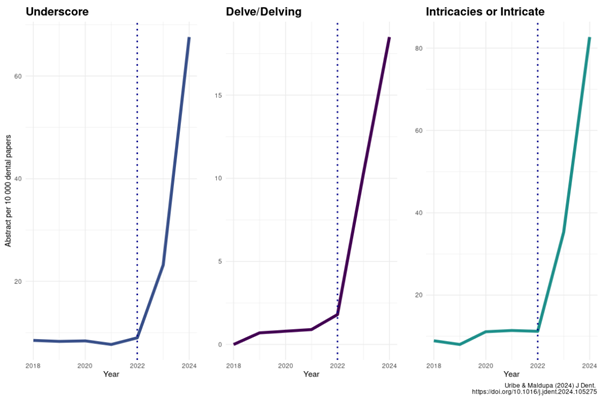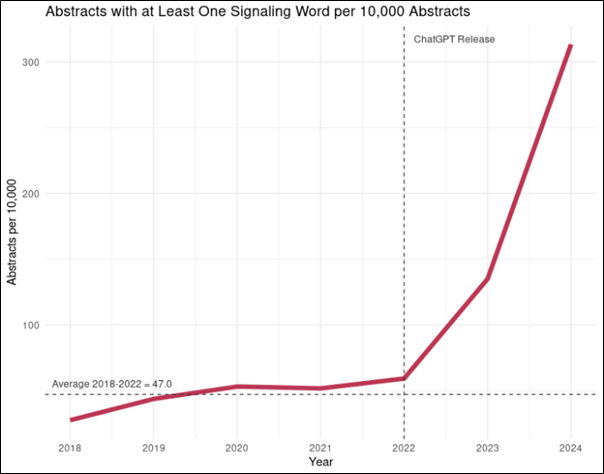RSU researchers highlight the use of ChatGPT in dental research writing
How many dental research publications have used ChatGPT for writing? The latest publication by lead researchers from the Rīga Stradiņš University (RSU) Department of Conservative Dentistry and Oral Health addresses this question.
The study, led by Assoc. Prof. Sergio Uribe and Dr. Ilze Maldupa, analysed nearly 300,000 dental research abstracts published between 2018 and 2024. Using a bibliometric approach, the researchers identified specific signal words commonly associated with content generated by ChatGPT. The results showed that nearly 10 out of every 100 papers contain these specific words, indicating a significant presence of AI-assisted writing in dental research. Some of these words are shown here. The dotted line marks the date that ChatGPT was released.

Key findings
- The word "delve" showed the most significant increase in usage, with a 17-fold increase in frequency after ChatGPT was released;
- Other words such as "transformative," "realm," and "revolutionize" also showed notable spikes, indicating a shift in the language used in dental research;
- To validate their findings, the researchers used dental-specific terms such as "periodontal" and "caries" as negative controls and "COVID" as positive control. The results showed stable use of the negative controls and the expected rise and fall of COVID-related terms, confirming the robustness of their methodology.

Assoc. Prof. Dr. Sergio Uribe comments: 'The emergence of generative AI tools such as ChatGPT will reconfigure the landscape of scientific publications. Previously, producing a paper was challenging, but this is no longer true. As a result, the evaluation of scientific productivity will likely shift from focusing on the paper to a more comprehensive evaluation of the entire research process. This will emphasise the importance of open science practices, such as pre-registration and the publication of datasets, which allow for the verification and replication of results. These will also increase the reproducibility of the research. These open science practices are also critical in preventing the spread of misinformation or disinformation, as was seen during the COVID-19 pandemic, and in restoring and enhancing public confidence in science.
Generative AI presents a tremendous opportunity to promote open science practices. For example, RSU was a pioneer in creating an open data repository that allows the University's researchers to publish their data following open science principles. In addition, generative AI can help bridge the gap between researchers and the public by facilitating the creation of papers with less scientific jargon or by adding summaries that the general public can easily understand.'
The researchers call for further investigation into GenAI's global impact on scientific writing and encourage the academic community to engage in discussions about the ethical use of these tools.
Source
- Uribe, S. E., Maldupa, I., 2024. "Estimating the use of ChatGPT in dental research publications." Journal of Dentistry. 149, https://doi.org/10.1016/j.jdent.2024.105275
Related news
 Sports psychology study on young athletes: how burnout, anxiety, and wellbeing shape distinct athlete profiles Research, Psychology
Sports psychology study on young athletes: how burnout, anxiety, and wellbeing shape distinct athlete profiles Research, Psychology




